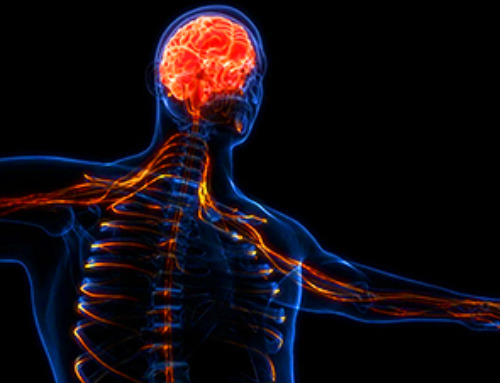Researchers at Aarhus University have discovered a method to identify Alzheimer's disease before it progresses to dementia, potentially opening up new avenues for treatment.
A groundbreaking study could pave the way for early detection and possibly offer a route to decelerate the advancement of Alzheimer's disease.
Researchers have discovered a special receptor on immune cells that can effectively bind and neutralize harmful "beta proteins", which are strongly associated with the disease.
"The method allows us to monitor disease-related changes at an earlier stage than is possible with traditional methods. And this is important when it comes to Alzheimer's because it's known to develop over a very long period of time. This is also why treatment is typically first started when the disease is already so advanced that it may be almost impossible to slow down," explains Kristian Juul-Madsen, postdoc at the Department of Biomedicine, Aarhus University, and one of the researchers behind the study.
"If we can activate the body's own immune system at an earlier stage of the disease, it might be possible to slow down its progression before it develops into full-blown dementia," he adds.
A great leap for diagnostics
The study suggests that the activity of the peripheral immune system may play a crucial role in the body's defense against Alzheimer's by preventing the accumulation of harmful proteins in the brain.
The new method uses an advanced type of blood test analysis that is particularly sensitive to the early stages of the disease. This is a major breakthrough compared to current diagnostic tools, such as PET scans, which can usually only spot the disease once it is at an advanced stage.
"Our hope is that these discoveries can pave the way for new strategies in the fight against Alzheimer's. By understanding how the immune system can be mobilized against early stages of the disease, we might be able to develop therapies that can intervene much earlier than current treatment options," says Kristian Juul-Madsen.
International attention
The results of the study have received international attention, and the research team behind the discovery is already planning follow-up projects to test the new method in a larger patient group.
The research team is also trying to understand the exact mechanisms behind the immune system's ability to fight the early signs of Alzheimer's, which could be key to developing even more effective treatments in the future.
"The biggest challenge in transferring our research to the clinic is that it takes a long time to test the beneficial effect of activating the immune system, as Alzheimer's is known to develop very slowly and you need to intervene at a very early stage," explains Kristian Juul-Madsen.
While the study is promising for the fight against Alzheimer's, it also raises some ethical concerns. After all, what will an early diagnosis of Alzheimer's mean for patients and their families when there is currently no effective treatment for the disease?
"Of course, it's sad if you can identify the development of a dangerous disease like Alzheimer's without being able to do anything to stop it. However, this is something we need to do in order to develop a treatment in the future," says Kristian Juul-Madsen.
Reference: "Amyloid-β aggregates activate peripheral monocytes in mild cognitive impairment" by Kristian Juul-Madsen, Peter Parbo, Rola Ismail, Peter L. Ovesen, Vanessa Schmidt, Lasse S. Madsen, Jacob Thyrsted, Sarah Gierl, Mihaela Breum, Agnete Larsen, Morten N. Andersen, Marina Romero-Ramos, Christian K. Holm, Gregers R. Andersen, Huaying Zhao, Peter Schuck, Jens V. Nygaard, Duncan S. Sutherland, Simon F. Eskildsen, Thomas E. Willnow, David J. Brooks and Thomas Vorup-Jensen, 9 February 2024, Nature Communications.
DOI: 10.1038/s41467-024-45627-y
News
Nerve Damage Can Disrupt Immunity Across the Entire Body
A single nerve injury can quietly reshape the immune system across the entire body. Preclinical research from McGill University suggests that nerve injuries may lead to long-lasting changes in the immune system, and these [...]
Fake Science Is Growing Faster Than Legitimate Research, New Study Warns
New research reveals organized networks linking paper mills, intermediaries, and compromised academic journals Organized scientific fraud is becoming increasingly common, ranging from fabricated research to the buying and selling of authorship and citations, according [...]
Scientists Unlock a New Way to Hear the Brain’s Hidden Language
Scientists can finally hear the brain’s quietest messages—unlocking the hidden code behind how neurons think, decide, and remember. Scientists have created a new protein that can capture the incoming chemical signals received by brain [...]
Does being infected or vaccinated first influence COVID-19 immunity?
A new study analyzing the immune response to COVID-19 in a Catalan cohort of health workers sheds light on an important question: does it matter whether a person was first infected or first vaccinated? [...]
We May Never Know if AI Is Conscious, Says Cambridge Philosopher
As claims about conscious AI grow louder, a Cambridge philosopher argues that we lack the evidence to know whether machines can truly be conscious, let alone morally significant. A philosopher at the University of [...]
AI Helped Scientists Stop a Virus With One Tiny Change
Using AI, researchers identified one tiny molecular interaction that viruses need to infect cells. Disrupting it stopped the virus before infection could begin. Washington State University scientists have uncovered a method to interfere with a key [...]
Deadly Hospital Fungus May Finally Have a Weakness
A deadly, drug-resistant hospital fungus may finally have a weakness—and scientists think they’ve found it. Researchers have identified a genetic process that could open the door to new treatments for a dangerous fungal infection [...]
Fever-Proof Bird Flu Variant Could Fuel the Next Pandemic
Bird flu viruses present a significant risk to humans because they can continue replicating at temperatures higher than a typical fever. Fever is one of the body’s main tools for slowing or stopping viral [...]
What could the future of nanoscience look like?
Society has a lot to thank for nanoscience. From improved health monitoring to reducing the size of electronics, scientists’ ability to delve deeper and better understand chemistry at the nanoscale has opened up numerous [...]
Scientists Melt Cancer’s Hidden “Power Hubs” and Stop Tumor Growth
Researchers discovered that in a rare kidney cancer, RNA builds droplet-like hubs that act as growth control centers inside tumor cells. By engineering a molecular switch to dissolve these hubs, they were able to halt cancer [...]
Platelet-inspired nanoparticles could improve treatment of inflammatory diseases
Scientists have developed platelet-inspired nanoparticles that deliver anti-inflammatory drugs directly to brain-computer interface implants, doubling their effectiveness. Scientists have found a way to improve the performance of brain-computer interface (BCI) electrodes by delivering anti-inflammatory drugs directly [...]
After 150 years, a new chapter in cancer therapy is finally beginning
For decades, researchers have been looking for ways to destroy cancer cells in a targeted manner without further weakening the body. But for many patients whose immune system is severely impaired by chemotherapy or radiation, [...]
Older chemical libraries show promise for fighting resistant strains of COVID-19 virus
SARS‑CoV‑2, the virus that causes COVID-19, continues to mutate, with some newer strains becoming less responsive to current antiviral treatments like Paxlovid. Now, University of California San Diego scientists and an international team of [...]
Lower doses of immunotherapy for skin cancer give better results, study suggests
According to a new study, lower doses of approved immunotherapy for malignant melanoma can give better results against tumors, while reducing side effects. This is reported by researchers at Karolinska Institutet in the Journal of the National [...]
Researchers highlight five pathways through which microplastics can harm the brain
Microplastics could be fueling neurodegenerative diseases like Alzheimer's and Parkinson's, with a new study highlighting five ways microplastics can trigger inflammation and damage in the brain. More than 57 million people live with dementia, [...]
Tiny Metal Nanodots Obliterate Cancer Cells While Largely Sparing Healthy Tissue
Scientists have developed tiny metal-oxide particles that push cancer cells past their stress limits while sparing healthy tissue. An international team led by RMIT University has developed tiny particles called nanodots, crafted from a metallic compound, [...]





















